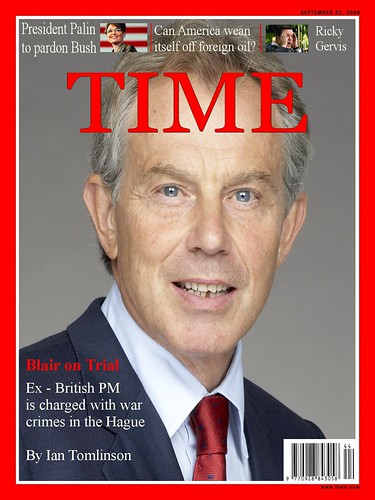In the months following Tony Blair's dramatic arrest at Amsterdam's Schiphol international airport last September the possibility that a former UK prime minister maybe be tried and sentenced for war crimes has gripped the imagination of people from New York to New Delhi. Media representatives from every corner of the planet have turned the sleepy Dutch city of the Hague into a international news circus dwarfing the coverage given the O.J Simpson trial in the 90's. According to latests foreign ministry accounts 6,560 reporters have descended upon city to cover this week's preliminary hearings which are scheduled to conclude next week.
Blair's detention on route to the EU conference on Middle East Security and Safety in Zurich severely strained UK – Dutch relations with some Conservative members of parliament even calling for the air strikes on military targets within the country if the former leader was not released. In the days that followed hundreds of businesses and organisations with ties with the Netherlands were attacked throughout America with three Dutch citizens losing their lives in bomb attack on the country's London embassy
Not surprisingly, it has been the question of the sense and the legitimacy of the trials that is the center of attention for many eyewitnesses. Despite the lack of a legal precedent, most of them approve of the proceedings because, as U.S. writer Gore Vidal put it, "warmongers will no longer be able to live quietly in retirement." Some observers, however, have remained skeptical. Iraqi writer Salah Wali considered the indictment "bizarre" and British diplomats in Brussels have privately admitted that the British didn't "enter the war with clean hands. No nation could have done so."
The defendant, who await the world's judgment in varying postures of resentment, resignation, and revolt, is another focus for most members of the press. "While the counsel for the prosecution reads UK documents about the killing of Iraqis and Afghans," railed Polish reporter Pawel Osmanczyk, enraged by the prisoner's deliberate display of boredom, "Blair yawns, or just pretends to be asleep."
Fascination for and disappointment about the banality of the man who helped in the possible murder of thousands of people also appear in the accounts of the reporters witnessing the proceedings. "Involuntarily one desires to see a greater man," wrote Australian journalist John Pliger, "who have to stand trial for all the cruelties which are spread out before the court." Afghan opposition leader, Abdullah Abdullah remarked incredulously: "He is so insignificant that you ask yourself: Was it really this degenerate who laid my country to waste... ?"
Read more: www.time.com/time/world/article/0,8599,174037,00.html#ixz...
Blair's detention on route to the EU conference on Middle East Security and Safety in Zurich severely strained UK – Dutch relations with some Conservative members of parliament even calling for the air strikes on military targets within the country if the former leader was not released. In the days that followed hundreds of businesses and organisations with ties with the Netherlands were attacked throughout America with three Dutch citizens losing their lives in bomb attack on the country's London embassy
Not surprisingly, it has been the question of the sense and the legitimacy of the trials that is the center of attention for many eyewitnesses. Despite the lack of a legal precedent, most of them approve of the proceedings because, as U.S. writer Gore Vidal put it, "warmongers will no longer be able to live quietly in retirement." Some observers, however, have remained skeptical. Iraqi writer Salah Wali considered the indictment "bizarre" and British diplomats in Brussels have privately admitted that the British didn't "enter the war with clean hands. No nation could have done so."
The defendant, who await the world's judgment in varying postures of resentment, resignation, and revolt, is another focus for most members of the press. "While the counsel for the prosecution reads UK documents about the killing of Iraqis and Afghans," railed Polish reporter Pawel Osmanczyk, enraged by the prisoner's deliberate display of boredom, "Blair yawns, or just pretends to be asleep."
Fascination for and disappointment about the banality of the man who helped in the possible murder of thousands of people also appear in the accounts of the reporters witnessing the proceedings. "Involuntarily one desires to see a greater man," wrote Australian journalist John Pliger, "who have to stand trial for all the cruelties which are spread out before the court." Afghan opposition leader, Abdullah Abdullah remarked incredulously: "He is so insignificant that you ask yourself: Was it really this degenerate who laid my country to waste... ?"
Read more: www.time.com/time/world/article/0,8599,174037,00.html#ixz...

No comments:
Post a Comment